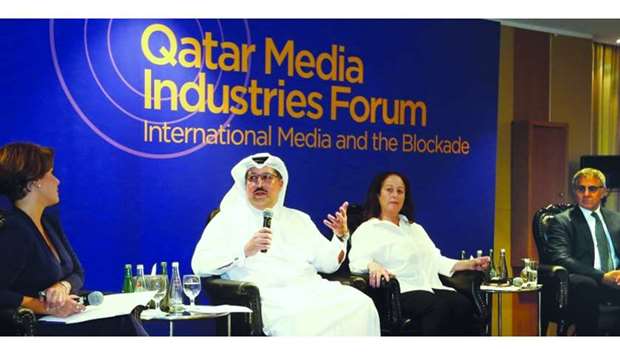Everette E Dennis, dean and CEO of NU-Q welcomed the gathering which included a number of distinguished guests including HE Sheikh Thani bin Hamad al-Thani.
Mohamed al-Jaidah, a prominent Qatari entrepreneur; Storer H Rowley, director of media relations, global marketing and communication, NU-Q; many other prominent Qataris, faculty and staff from NU-Q as well as a large number of general public were present at the event.
The panelists at the session were Faisal Abdulhameed al-Mudahka, editor-in-chief, Gulf Times; Borzou Daragahi, Middle East correspondent for BuzzFeed News; and Vivienne Walt, foreign correspondent for TIME Magazine. The session was moderated by Banu Akdenizli, associate professor at NU-Q.

Everette E Dennis, dean and CEO of NU-Q welcoming the gathering

Faisal Abdulhameed al-Mudahka, editor-in-chief, Gulf Times with HE Thani bin Hamad al-Thani

Borzou Daragahi, Middle East correspondent for BuzzFeed News speaking at the event

Mohamed al-Jaidah, a Qatari entrepreneur discussing a topic during the forum.

A section of the audience at the event
Towards the end of the panel discussion, Rob Wood director of strategic partnerships at NU-Q presented the findings of a survey in the US, UK and UAE regarding the terms used about the crisis until end of September. A repeat session of the panel was held at NU-Q where a large number of students participated and interacted with the panelists.
“Media should build bridges and put people together instead of reporting bad news. That is the need of the hour and it has been the case on several occasions worldwide. Such an attitude can bring an end to unwanted propaganda as well as fake news,” said, one of the panelists at the forum.
Opening the session, al-Mudahka said that the international media houses covered the Gulf Crisis fairly. “Most international media had the right editorial and details but what really surprised me was the Arabic version of their channels. For example, Sky News Arabic editorial and their coverage of the Gulf Crisis was very partial. Even after four months of blockade, they are presenting only one view. They never tried to collect the views of Qatari side,” he said.
Al-Mudahka also pointed out that some channels like Al Jazeera followed an independent view and presented the views from all sides and were open hearted while some other channels were an embarrassment.
Walt noted “ Some of the reporting on the Gulf Crisis seemed to be lacking focus as some of them were faced with confusion and even chaos about US president Donald Trump’s tweets about Qatar and the crisis. The crisis overshadowed the underlying issues and what it is all about.”
Daragahi was of the view that the international media had covered the crisis honourably and with great balance. He also attributed that the international media's support for Qatar is in accordance with some international principles which are based on certain core values, the western journalists follow.
Regarding fake news, al-Mudahka highlighted that the whole crisis started with the issue of fake news. “The trigger of the whole crisis was the fake news spread by the blockading countries by hacking Qatar News Agency. There was a fake news on food supply spread by blockading countries. Al Arabia reported that Qatar hired a person who deals with black magic. There were so many funny things.”
He also told that to counter the issue of fake news, a cartoon section has been started in Gulf Times.
“This is my humble way of fighting the fake news. However, it played to our benefit. They are silly and people can easily understand what is right and what is wrong. I am collecting all this fake news to publish a book in future along with all the cartoons,” he added.
Walt noted that fake news is one of the most complex and urgent problems, While Daragahi called it a satire. “This is a big problem and the technology platforms have to look into it carefully to tackle it. There a measure of responsibility that needs to be measured up to,” he highlighted.
As for the role social media in the crisis, al-Mudahka pointed out that social media is a platform to shape the ideas of the viewers. He explained, “The social media army from the blockading countries spread a lot of hate speech which our community is not used to. Social media has been used to spread extremism. People from the blockading countries used several campaigns including religion against us in the crisis. We saw singers being used against Qatar.”
Walt said that social media is an empowering factor in the recent years. “It has been tremendously useful for exchange of views especially during the time when traditional media is losing revenues,” she continued.
According to Daragahi, social media can be used as a tool for journalism but cannot be used as tool of information “As a tool of information it is totally damaging. Social media can distort the happenings. It does more damage than any good for ordinary people as source of news. However it is a great tool for journalism,” he maintained.


